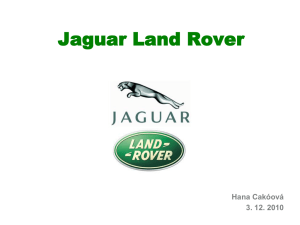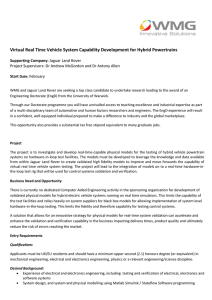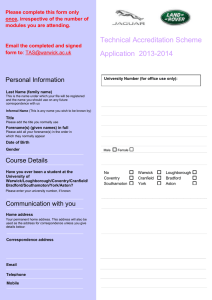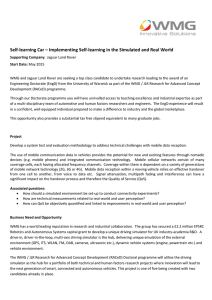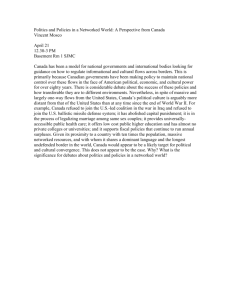Jaguar Land Rover challenges –
advertisement
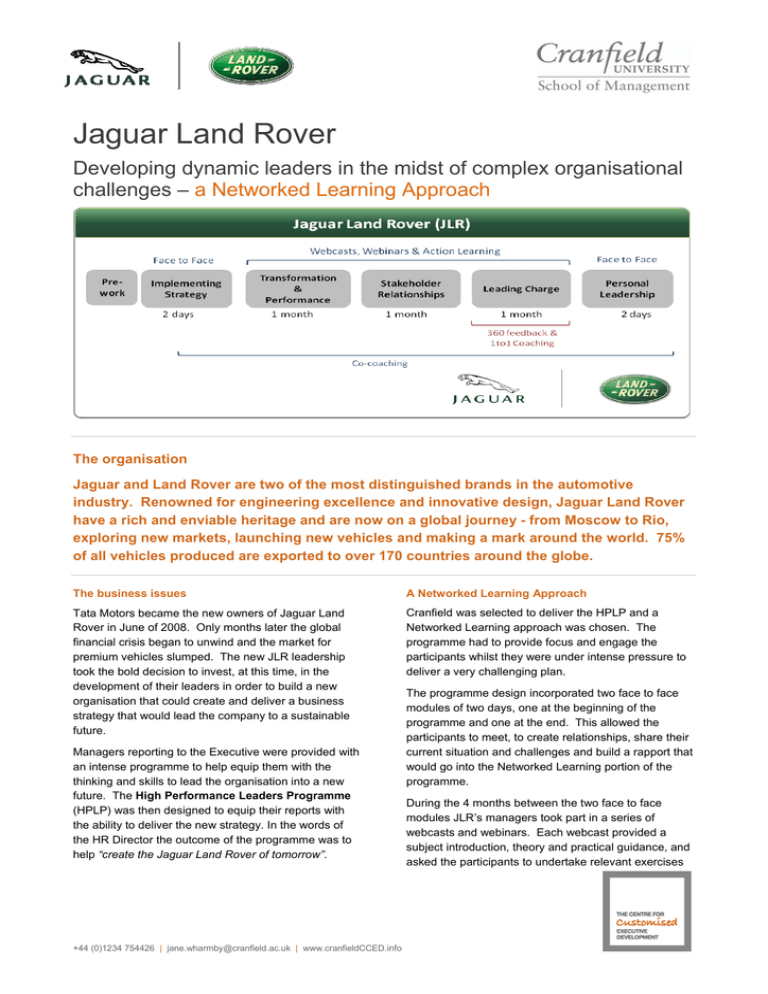
Jaguar Land Rover Developing dynamic leaders in the midst of complex organisational challenges – a Networked Learning Approach The organisation Jaguar and Land Rover are two of the most distinguished brands in the automotive industry. Renowned for engineering excellence and innovative design, Jaguar Land Rover have a rich and enviable heritage and are now on a global journey - from Moscow to Rio, exploring new markets, launching new vehicles and making a mark around the world. 75% of all vehicles produced are exported to over 170 countries around the globe. The business issues A Networked Learning Approach Tata Motors became the new owners of Jaguar Land Rover in June of 2008. Only months later the global financial crisis began to unwind and the market for premium vehicles slumped. The new JLR leadership took the bold decision to invest, at this time, in the development of their leaders in order to build a new organisation that could create and deliver a business strategy that would lead the company to a sustainable future. Cranfield was selected to deliver the HPLP and a Networked Learning approach was chosen. The programme had to provide focus and engage the participants whilst they were under intense pressure to deliver a very challenging plan. Managers reporting to the Executive were provided with an intense programme to help equip them with the thinking and skills to lead the organisation into a new future. The High Performance Leaders Programme (HPLP) was then designed to equip their reports with the ability to deliver the new strategy. In the words of the HR Director the outcome of the programme was to help “create the Jaguar Land Rover of tomorrow”. +44 (0)1234 754426 | jane.wharmby@cranfield.ac.uk | www.cranfieldCCED.info The programme design incorporated two face to face modules of two days, one at the beginning of the programme and one at the end. This allowed the participants to meet, to create relationships, share their current situation and challenges and build a rapport that would go into the Networked Learning portion of the programme. During the 4 months between the two face to face modules JLR’s managers took part in a series of webcasts and webinars. Each webcast provided a subject introduction, theory and practical guidance, and asked the participants to undertake relevant exercises Customised Executive Development in their place of work. Participants could work at their own pace and at a time convenient to them and were asked to submit a single slide explaining their individual experience of the module (though sometimes two or three individuals would work together to complete an exercise). Each module ended with the participants attending a webinar to question, discuss and review their activities and their submissions. The final two-day face to face module enabled learning to be shared and consolidated, and the critical leadership skills to be further developed. Impact Within the organisation, leadership and a sense of purpose is growing. At a senior level there has been an improved willingness to discuss the role of leaders and to question the status quo, along with a renewed sense of excitement and purpose in meeting stretch targets. At a middle management level there has been increasing acceptance of the new role of leadership and recognition that effective leadership throughout the organisation is a key to the future success of Jaguar Land Rover. The latest cohort to finish the programme gave the following feedback: “Excellent, it’s been a huge eye opener and I’ve learnt a lot. The 360 and second 2 days were really insightful. I will make changes to my own behaviours as a result and have already started this and seen results.” “Really insightful and made me look deep inside and really reflect on relationships.” “The facilitation of the trainers was very good but above all else I appreciated the excellent inputs of my fellow cohort.” Why Networked Learning? The Networked Learning approach meant participants could build knowledge and develop skills across a number of areas whilst minimising time away from the workplace. The flexibility of the approach enabled individuals to manage their own learning at times convenient to them. Networked Learning was a cost-effective way for the organisation to provide learning across a number of knowledge and skill requirements, to JLR employees working around the globe. Jaguar Land Rover has gone from strength to strength over the last twelve months, delivering growth in profitability and revenue. We believe this programme has made a significant contribution to the business turnaround. Why Cranfield? Cranfield’s expertise and reputation as a university in the field of engineering and the automotive industries has been important in the relationship with JLR. Additionally Cranfield was able to demonstrate a proven experience in customising executive development for large global organisations taking a pragmatic approach that emphasises swift implementation of new learning. The face to face environment was reserved for interventions where personal contact and greater intimacy was required. The networked learning capability provided JLR executives with the advantage of being able to share knowledge, experience and implementation ideas with their peers around the world without needing to leave the country. Facts and figures January 2012 Between July 2010 and January 2012 some 200 leaders have taken part in the programme in 10 cohorts. Over the next 12 months a further 6 to 7 programmes are scheduled to provide the development opportunity for all the leaders at this level in the organisation. The networked learning approach enabled JLR to deliver the programme to global executives from 11 different nationalities across 4 continents. +44 (0)1234 754426 | jane.wharmby@cranfield.ac.uk | www.cranfieldCCED.info
